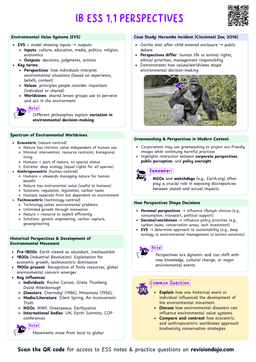Moral Standing in Environmental Ethics
Moral standing
Moral standing refers to the idea that an entity (whether living or non-living) has moral significance and should be considered when making decisions about how we interact with it.
To ask if something has moral standing is to consider whether it should be morally respected or whether it has a claim on human actions and behaviors.
Different Perspectives on Moral Standing
Ecocentric View
- Ecocentrists believe that all living things have moral standing because they possess intrinsic value.
- This includes not only individual organisms but also entire ecosystems, such as forests, rivers, and landscapes.
- Ecocentrism extends moral standing beyond humans and focuses on the health and stability of the entire biotic community (all living organisms and their interactions).
Aldo Leopold's Land Ethic argues that:
- "A thing is right when it tends to preserve the integrity, stability, and beauty of the biotic community."
- "It is wrong when it tends otherwise."
Leopold suggests that the land, animals, and plants within it all have inherent value and deserve to be respected, regardless of their utility to humans.
Extension to Non-Living Entities
- Some ecocentrists extend moral standing to non-living entities in nature, such as rivers, rocks, and landscapes.
- They argue that these elements also have intrinsic value and are deserving of protection and moral consideration.
- This perspective challenges anthropocentric views that see nature primarily as a resource for human use.
A river or mountain range may be seen as having moral standing because it contributes to the overall stability and health of the ecosystem, which in turn supports all living organisms.
Anthropocentric and Biocentric Views
- In contrast to ecocentrism, anthropocentrists argue that only humans or human interests have moral standing, often emphasizing human well-being over other forms of life or ecosystems.
- Biocentrism places moral standing on all living organisms, focusing on the ethical treatment of plants and animals rather than the environment as a whole.
Moral Standing of Future Generations
- The idea of future generations having moral standing is another important aspect of environmental ethics.
- This concept asks whether humans alive today have moral obligations towards future generations, and to what extent we should consider the long-term impacts of our actions.
- If we degrade the environment today for short-term gains, should we feel morally responsible for the environmental damage it causes to people in the future, even if they are not yet born and will not benefit us directly?
- Ethical Obligation: This raises questions about intergenerational justice and the ethical responsibility we have to maintain a livable planet for the next generation.
- Example: A government or corporation might choose to invest in sustainable technologies or conservation efforts as a way to ensure that future generations inherit a world that is capable of supporting life.
How do cultural and religious beliefs shape our views on moral standing? Can these perspectives help bridge the gap between anthropocentric and ecocentric worldviews?


